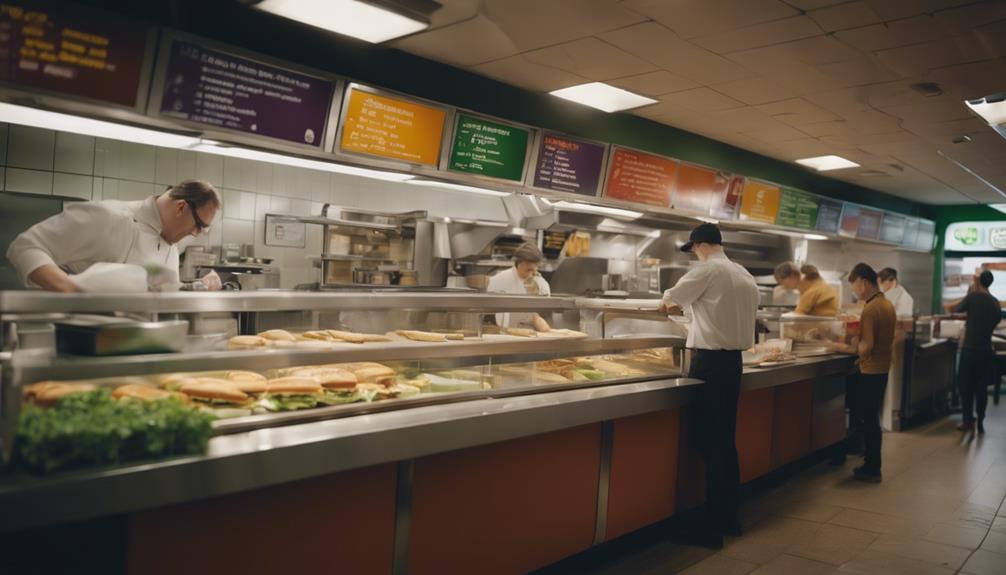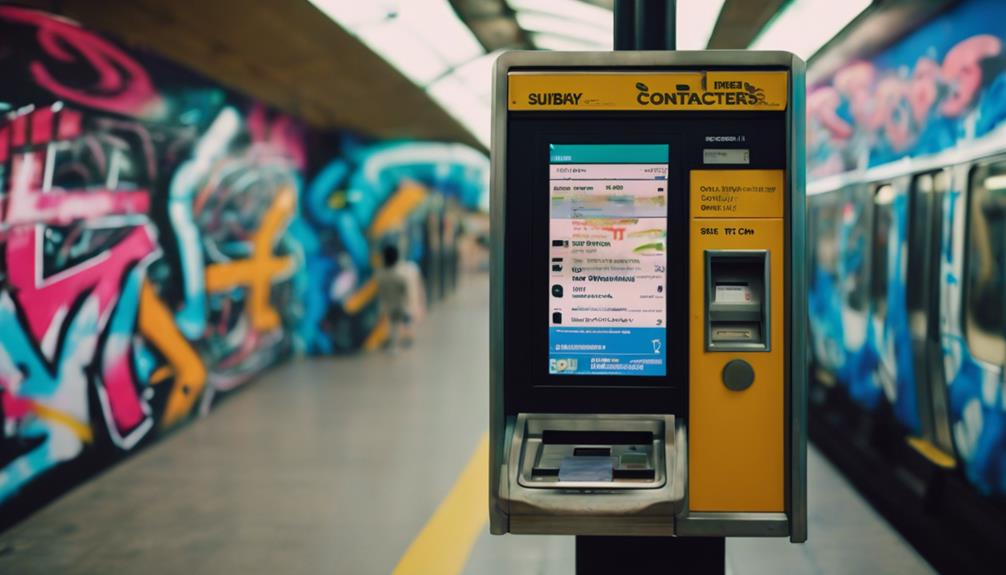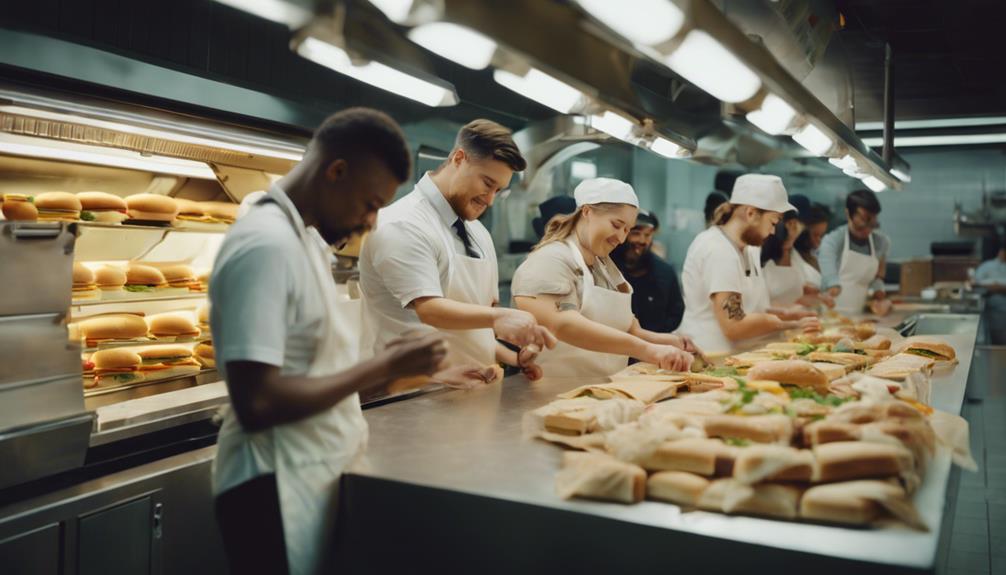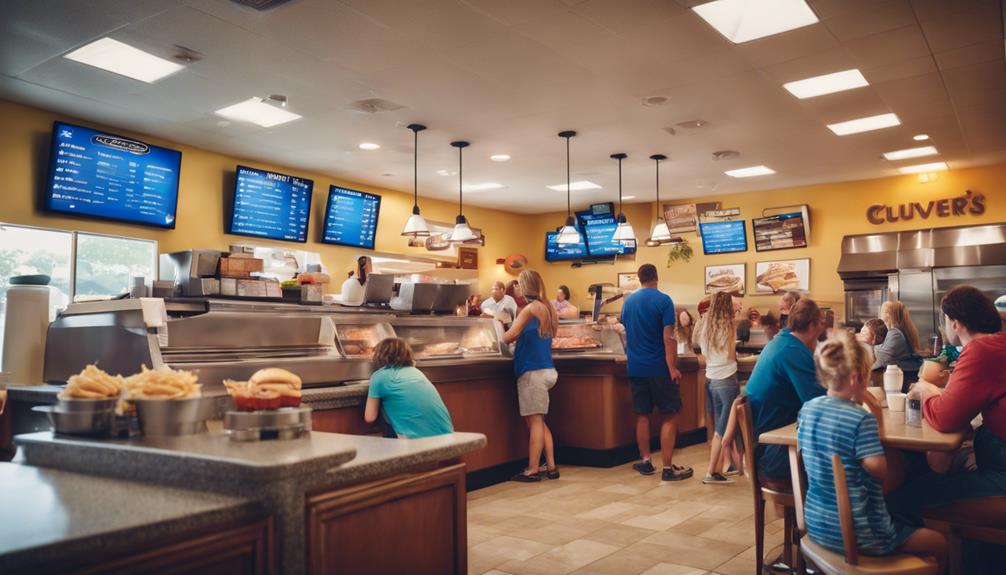Subway’s surprising revelations are found in its forward-thinking strategy and dedication to using fresh ingredients. Established in 1965, it has grown to have over 44,000 stores worldwide, selling roughly 7.6 million sandwiches each day. It may come as a shock to customers that Subway offers almost 38 million sandwich combinations, catering to a wide range of dietary preferences. By incorporating local food trends through its franchise model, Subway is able to appeal to a global audience. Furthermore, their use of 16 acres of lettuce daily demonstrates their commitment to maintaining high standards of quality and freshness. This meticulous approach to sourcing ingredients and allowing for customer customization distinguishes Subway from the rest, suggesting that there are many more intriguing aspects yet to be revealed about its operations.
Key Elements

In exploring Subway's key elements, it's crucial to understand the company's foundational overview, business model, and what potential franchisees need to know.
These components highlight Subway's unique position in the fast-food industry and provide insights into its operational strategies.
Company Overview
Subway stands as a global leader in the fast-food industry, renowned for its extensive menu variety and commitment to fresh ingredients. Founded in 1965, the brand has grown to over 44,000 locations in 110 countries, employing more than 410,000 individuals.
With nearly 38 million possible sandwich combinations, Subway caters to diverse dietary preferences, including plant-based options. The company prioritizes fresh ingredients, using 16 acres of lettuce daily, which reinforces its fresh image.
Additionally, Subway adapts its menu to reflect local cuisine trends, enhancing its global appeal. The unique store aroma created by freshly baked bread further enriches customer experience, helping to establish Subway as a notable player in the fast-casual dining sector.
Business Overview
With over 44,000 locations worldwide, Subway showcases a robust franchise model that emphasizes fresh ingredients and menu diversity. The company serves approximately 7.6 million sandwiches daily, catering to a wide array of dietary preferences with nearly 38 million possible sandwich combinations.
This extensive variety not only enhances customer experience but also allows for localization in international markets. Subway's commitment to fresh ingredients is evident in its daily use of 16 acres of lettuce.
The brand's innovative marketing strategies and community engagement initiatives further solidify its position in the fast-food industry. Coupled with a transparent approach to nutritional information, Subway continues to adapt and thrive in a competitive landscape, appealing to health-conscious consumers and diverse demographics alike.
Information for Franchisees
Franchisees benefit from a thorough support system that includes training programs and financial performance benchmarks to guarantee brand consistency.
Subway offers extensive training covering operations, marketing, and customer service, ensuring franchisees understand the brand's standards and values. This structured approach helps new franchisees navigate the initial challenges of running a business.
Additionally, Subway provides ongoing support through regular performance evaluations and access to a network of experienced peers. Franchisees also gain insights from financial benchmarks that highlight successful practices within the system.
This combination of training and support fosters a collaborative environment, enabling franchisees to thrive and maintain Subway's commitment to quality and customer satisfaction across all locations.
Company Overview

Subway, founded in 1965 by Fred DeLuca, has built its reputation on a commitment to fresh ingredients and customization.
With more locations worldwide than McDonald's, it stands as a significant player in the fast-food industry.
The executive team continues to drive innovation and maintain the brand's focus on quality and customer satisfaction.
Founded in 1965 by DeLuca
In 1965, Fred DeLuca launched the first Subway location in Bridgeport, Connecticut, after investing $1,000 from a family friend, Peter Buck. Originally named Pete's Super Submarines, the shop quickly drew customers with its affordable prices, offering sandwiches priced between $0.49 and $0.69.
DeLuca's vision was to create a place where people could enjoy delicious, made-to-order sandwiches. Over the years, Subway grew exponentially, expanding its menu and adapting to changing consumer preferences. By focusing on quality and customization, the brand established itself as a significant player in the fast-food industry.
Today, Subway operates over 44,000 locations worldwide, proving that DeLuca's initial idea has transformed into a global phenomenon, enchanting sandwich lovers everywhere.
Commitment to Fresh Ingredients
A strong commitment to fresh ingredients sets the foundation for Subway's reputation, ensuring customers enjoy high-quality, flavorful sandwiches made from carefully sourced produce.
Every day, Subway uses an impressive 16 acres of lettuce, equating to approximately 12 football fields, underscoring its dedication to freshness.
The company prioritizes transparency in ingredient sourcing, phasing out controversial additives like azodicarbonamide in favor of healthier alternatives.
Subway's menu boasts nearly 38 million sandwich combinations, accommodating various dietary preferences, including plant-based options.
This focus on freshness not only enhances the taste but also builds consumer trust, making Subway a leader in the fast-casual dining sector.
Their commitment to quality ingredients truly sets them apart in a competitive market.
Executive Team and Management
The commitment to fresh ingredients is supported by a strong executive team and management structure that drives Subway's vision and operational efficiency.
Led by experienced professionals, this team focuses on innovation and strategic growth, ensuring that Subway adapts to market trends and consumer preferences. Their collaborative approach fosters a culture of accountability and transparency, enhancing brand trust.
The management team implements rigorous training programs for franchisees, ensuring consistency across all locations. Additionally, they prioritize sustainability initiatives, aiming to reduce the company's environmental footprint.
With a keen eye on both financial performance and community engagement, Subway's leadership continues to navigate the competitive landscape, reinforcing the brand's position as a leader in the fast-casual dining sector.
Subway Outnumbers Mcdonald's Locations
Subway boasts over 44,000 locations worldwide, surpassing McDonald's and solidifying its status as a dominant player in the fast-food industry. This impressive network spans 110 countries, employing over 410,000 individuals.
Subway's expansion strategy focuses on adapting menu offerings to cater to local tastes, driving its rapid growth in international markets. This approach allows customers to enjoy unique, culturally relevant options while maintaining the brand's core values of fresh ingredients and customization.
As a result, Subway continues to challenge traditional fast-food norms, positioning itself as a go-to choice for those seeking healthier meal options. Its extensive reach and commitment to innovation guarantee Subway remains a formidable competitor in the ever-evolving fast-food landscape.
Brand Identity

Subway's brand identity stands out with its global recognition and commitment to sustainability practices.
Customers appreciate the ability to customize their sandwiches, which enhances their dining experience and fosters brand loyalty.
This combination of awareness, environmental responsibility, and personalization shapes Subway's unique position in the competitive fast-food landscape.
Global Brand Awareness Ranking
In the fast-food industry, Subway consistently ranks among the top global brands, showcasing its widespread recognition and loyalty. With over 44,000 locations across 110 countries, Subway's extensive reach contributes to its formidable brand presence.
The company's innovative marketing strategies, including community engagement and social media campaigns, resonate with diverse demographics, further solidifying its status.
Subway's menu variety, featuring nearly 38 million sandwich combinations, caters to customer preferences and dietary needs, enhancing brand appeal. Additionally, the brand's commitment to freshness and quality ingredients reinforces its image as a healthy fast-food option.
As a result, Subway continues to thrive in a competitive landscape, maintaining a strong position in global brand awareness rankings.
Commitment to Sustainability Practices
A strong commitment to sustainability practices shapes Subway's brand identity, reflecting its dedication to environmental responsibility and community well-being.
The company actively reduces plastic waste and prioritizes eco-friendly packaging materials, aligning with consumer demand for greener options.
Additionally, Subway sources ingredients from sustainable farms, ensuring quality while supporting ethical practices.
Restaurants are designed with energy-efficient systems that minimize environmental impact.
Community programs focused on environmental awareness also illustrate Subway's commitment to giving back.
By embracing sustainability, Subway not only enhances its brand reputation but also fosters a loyal customer base that values ethical consumption.
This strategic approach positions Subway as a leader in the fast-casual dining sector, committed to a healthier planet and community engagement.
Customizable Sandwich Options
Offering nearly 38 million sandwich combinations, the brand emphasizes customization as a key aspect of its identity, catering to a wide array of tastes and dietary preferences.
Customers can choose from various bread types, proteins, and an extensive selection of toppings, ensuring that each sandwich is uniquely tailored. This focus on personalization not only enhances the dining experience but also positions Subway as a versatile option for health-conscious consumers, particularly with its plant-based offerings.
Limited-time promotions and international menu items further enrich the experience, reflecting local flavors and trends. By prioritizing customization, Subway successfully differentiates itself from competitors, fostering loyalty and encouraging repeat visits from diverse clientele seeking their perfect sandwich.
Information for Franchisees

Subway provides extensive support and resources to franchisees, ensuring they've the tools needed to succeed in a competitive market.
The franchise model features thorough training programs that cover everything from store operations to marketing strategies. Franchisees benefit from a well-established brand, enabling them to attract customers through recognized quality and consistency.
Additionally, Subway offers ongoing assistance, including product updates and promotional materials, to keep franchisees informed and competitive.
The system emphasizes community involvement, encouraging franchisees to engage with local customers through events. This hands-on approach fosters a strong connection between franchisees and their communities, ultimately driving sales and enhancing brand loyalty.
With these resources, Subway empowers franchisees to thrive in the fast-food industry.
Financial Requirements & Ongoing Fees

When considering a Subway franchise, potential owners need to understand the financial requirements that come with it.
An initial investment of $1,000 from Peter Buck set the foundation, but ongoing fees like royalties and marketing contributions are essential for long-term success.
These financial commitments play a significant role in maintaining brand consistency and supporting franchise operations.
1,000 From Peter Buck
Franchisees must meet specific financial requirements and ongoing fees to successfully operate a Subway location, ensuring proper investment in the brand's growth and sustainability.
Initial fees typically include a franchise fee and an ongoing royalty fee based on sales. These fees contribute to shared marketing efforts and brand support, helping franchisees thrive in a competitive market.
Additionally, franchisees need to budget for operational costs, including rent, utilities, and employee wages, which vary depending on location. Regular supply purchases for fresh ingredients also impact financial planning.
Maintaining strong financial health is essential, as it directly influences a franchisee's ability to meet brand standards and succeed in delivering the Subway experience customers expect.
Initial Investment Requirement
Starting a Subway location requires a significant initial investment, which includes franchise fees and ongoing royalties tied to sales.
Franchisees typically pay an initial fee that grants them access to the brand and its support system. This fee can range from $10,000 to $15,000, depending on the specific agreement.
Additionally, franchisees must budget for equipment, supplies, and leasehold improvements, which can total $100,000 or more.
Ongoing fees consist of royalty payments calculated as a percentage of gross sales, alongside contributions to national marketing efforts.
Understanding these financial requirements is essential for potential franchisees, as they impact both the startup process and the long-term profitability of their Subway location.
Ongoing Franchise Revenue Percentage
To maintain brand consistency and support national marketing efforts, Subway franchisees pay ongoing royalty fees that are typically calculated as a percentage of their gross sales. This fee generally hovers around 8%, ensuring franchisees contribute to the collective strength of the brand.
Additionally, franchisees must prepare for potential fluctuations in sales, as these fees directly impact their profitability. Subway also requires franchisees to keep up with other financial obligations, including local advertising fees that can further affect their bottom line.
Marketing Contribution Requirements
In addition to ongoing royalty fees, Subway franchisees are required to contribute to a national marketing fund, which typically involves a percentage of their gross sales. This ensures effective brand promotion and visibility across all locations.
This marketing contribution plays a crucial role in maintaining the Subway brand's presence in a competitive fast-food landscape. Franchisees benefit from national advertising campaigns that drive customer traffic and enhance brand recognition.
The funds support various marketing initiatives, including digital advertising, social media engagement, and community outreach programs. By participating in this national marketing strategy, franchisees align with Subway's overall vision, fostering a unified brand message while also gaining access to resources that might be difficult to achieve independently.
Royalties and Supply Chain Fees
Subway franchisees pay ongoing royalties based on their gross sales, along with supply chain fees that cover ingredient procurement and distribution costs. These royalties typically range from 8% to 12% of gross sales, ensuring that franchisees contribute to the brand's overall success.
The supply chain fees help maintain consistency in ingredient quality, which is essential for Subway's reputation of fresh and customizable sandwiches.
Additionally, franchisees face initial setup costs and ongoing fees for marketing support and technology upgrades.
While these financial requirements might seem steep, they play a significant role in maintaining operational efficiency and brand integrity, helping franchisees thrive in the competitive fast-food landscape.
Financing Options

When it comes to financing options, potential Subway franchisees have several avenues to explore.
They can access franchisee loan assistance, alternative funding sources, and partnerships with the Small Business Administration.
These resources provide critical support for those looking to invest in their own Subway location.
Franchisee Loan Assistance Options
Franchisees can explore various loan assistance options to help finance their Subway locations effectively. These options often include Small Business Administration (SBA) loans, which offer favorable terms for new franchisees.
Some financial institutions specifically cater to franchise businesses, providing tailored loan programs that consider the unique needs of Subway owners.
Additionally, Subway's corporate team may assist franchisees in accessing financing resources or partnerships with lenders familiar with the brand.
Franchisees can also look into equipment financing, which allows them to acquire necessary kitchen equipment without a hefty upfront cost.
Alternative Funding Sources Available
Exploring alternative funding sources can provide franchisees with additional avenues to finance their Subway locations effectively. Many franchisees turn to personal savings, leveraging their own assets to secure initial investments.
Crowdfunding platforms are also gaining traction, enabling them to gather support from friends, family, and the community. Additionally, some franchisees explore peer-to-peer lending, which connects them directly with individual investors willing to fund their ventures.
Business grants and competitions can offer non-repayable funds for innovative ideas, while local economic development programs may provide financial incentives.
Small Business Administration Partners
The Small Business Administration partners with various financial institutions to offer franchisees accessible financing options tailored to their needs.
These partnerships provide loans with favorable terms, making it easier for aspiring Subway owners to secure the capital necessary to open their locations.
The SBA's 7(a) loan program, for instance, offers up to $5 million, with competitive interest rates and repayment terms that can extend up to 25 years.
Franchisees can also benefit from guidance on credit requirements and business plans, ensuring they've the support needed throughout the financing process.
Training & Support Offered

Subway provides new franchisees with thorough onboarding workshops to guarantee they understand the brand's operations.
Regular skill enhancement sessions keep staff updated on best practices and innovations in sandwich preparation.
Additionally, detailed training manuals and guides serve as valuable resources for ongoing support and consistency across locations.
Comprehensive Onboarding Workshops
How can new franchisees guarantee their success in the competitive fast-food landscape?
Thorough onboarding workshops provide extensive training and support to equip them with essential skills and knowledge. These workshops cover everything from operational procedures to employee management, ensuring franchisees are well-prepared to run their businesses smoothly.
Participants learn about Subway's unique brand values, customer service expectations, and effective marketing strategies. Additionally, franchisees receive insights into inventory management and financial planning, vital for long-term sustainability.
The hands-on approach fosters a sense of community and shared purpose among new franchisees, helping them build valuable networks. With this detailed support, franchisees can confidently navigate challenges and thrive within Subway's dynamic and evolving marketplace.
Regular Skill Enhancement Sessions
Regular skill enhancement sessions empower franchisees and their staff to stay updated on best practices and industry trends, ensuring they maintain a competitive edge. These sessions cover a variety of essential topics, such as customer service excellence, food safety protocols, and efficient sandwich preparation techniques.
By participating in these regular training opportunities, employees gain confidence in their roles and improve their overall performance. The sessions also foster team cohesion, encouraging communication and collaboration among staff members.
Additionally, Subway's commitment to ongoing development helps franchisees adapt to changing market demands and consumer preferences. This proactive approach not only enhances service quality but also promotes a culture of continuous improvement across all locations, ultimately benefiting the brand's reputation and success.
Training Manuals and Guides
Providing extensive training manuals and guides, Subway equips franchisees and their staff with the essential knowledge needed to operate efficiently and uphold brand standards.
These resources cover everything from sandwich preparation techniques to customer service protocols, ensuring consistency across locations.
New franchisees benefit from thorough onboarding programs that include hands-on training alongside the manuals.
The guides also address health and safety regulations, helping to maintain a safe environment for both employees and customers.
Regular updates to these materials keep staff informed about menu changes and promotions, fostering an adaptable workforce.
LEGAL AND REGULATORY

Subway's franchise agreements outline essential guidelines that franchisees must follow to maintain brand consistency and operational efficiency.
These agreements specify everything from operational standards to marketing requirements, ensuring that each location reflects Subway's core values.
Franchise Agreement Guidelines
Franchise agreement guidelines are essential for anyone looking to join the Subway network.
Franchisees need to understand their legal obligations and the key sections of the agreement that outline their rights and responsibilities.
Key Sections to Review
Regularly, potential franchisees should carefully review key sections of the franchise agreement to understand their rights and obligations.
This includes examining the initial franchise fee, ongoing royalties, and territorial rights.
Additionally, they should note any restrictions on operations and the duration of the agreement.
Understanding these elements helps franchisees make informed decisions and align expectations with Subway's operational standards.
Legal Obligations
When entering into a franchise agreement, potential franchisees must understand their legal obligations, including compliance with local regulations and adherence to Subway's operational standards.
They must familiarize themselves with the franchise disclosure document, which outlines key policies, fees, and performance expectations.
Additionally, franchisees should guarantee they maintain brand consistency to avoid potential legal disputes that could arise from operational discrepancies.
MARKET ANALYSIS

Market analysis reveals a growing consumer demand for freshness, particularly among health-conscious young adults.
This demographic values transparency in ingredient sourcing and healthier fast-food options, aligning perfectly with Subway's offerings.
Consumer Demand for Freshness
Subway's success hinges on its ability to meet the growing consumer demand for freshness and customization.
Customers increasingly seek healthier options, prompting the chain to innovate its menu with fresh ingredients and diverse selections.
This shift not only caters to health-conscious diners but also enhances the overall dining experience by allowing for personalized meal choices.
Growing Demand for Customization
Consumers increasingly crave personalized dining experiences, driving the growing demand for customization in fast-casual restaurants.
Subway meets this need with nearly 38 million possible sandwich combinations, allowing patrons to tailor their meals. This flexibility not only enhances customer satisfaction but also attracts diverse dietary preferences.
Rising Demand for Healthier Options
How can restaurants adapt to the rising demand for healthier options while maintaining their appeal to a broad audience?
By focusing on fresh ingredients and innovative menu items, they can attract health-conscious consumers.
Subway has embraced this trend, introducing plant-based options and emphasizing transparency in nutritional information.
This ensures customers feel good about their choices while enjoying diverse, customizable meals.
Health-Conscious Young Adults
Health-conscious young adults are increasingly shaping consumer preferences in the fast-food industry.
They prioritize nutritious options and seek transparency in ingredient sourcing, making Subway's menu innovations particularly appealing.
As this demographic continues to grow, Subway's commitment to healthier choices positions the brand favorably in a competitive market.
Health-Conscious Young Adults
Young adults increasingly seek healthier meal options, making Subway's diverse menu and customizable sandwiches particularly appealing.
This demographic prioritizes fresh ingredients and transparency in nutritional information.
With nearly 38 million sandwich combinations, Subway caters to various dietary preferences, including plant-based options.
As health-conscious young adults embrace convenient yet nutritious meals, Subway's offerings align perfectly with their lifestyle choices, enhancing brand loyalty and customer engagement.
Consumer Preference Trends
As consumers increasingly prioritize nutritious and convenient meal options, Subway's menu diversity and customization resonate well with their preferences.
Health-conscious young adults appreciate the extensive range of ingredients, including plant-based choices, which cater to various dietary needs.
The ability to personalize meals enhances their dining experience, allowing them to enjoy healthier fast food without sacrificing taste or convenience.
EXIT STRATEGY

Subway's exit strategy focuses on its franchise buyback program, making it easier for franchisees to shift out when needed.
This program outlines clear terms and conditions, ensuring a smooth process for both parties involved.
Additionally, Subway provides detailed procedures for franchise transfer, allowing owners to sell their businesses while maintaining brand integrity.
Franchise Buyback Program Details
Franchisees looking to exit the business can benefit from Subway's Franchise Buyback Program, designed to provide a streamlined process for selling their stores back to the company.
This program offers a smooth shift, ensuring franchisees receive fair market value for their investment. Subway evaluates each store's performance and condition, allowing for a transparent assessment.
The buyback process typically involves an initial consultation, followed by an appraisal and negotiation. Once terms are agreed upon, Subway handles the logistics, making it easier for franchisees to move on to new opportunities.
This initiative not only supports exiting franchisees but also helps maintain Subway's brand integrity and operational consistency across its vast network of locations.
Franchise Transfer Procedures Explained
The Franchise Transfer Procedures provide a structured exit strategy for franchisees looking to pass on their business to new owners, guaranteeing a smooth and efficient transfer.
These procedures outline the necessary steps, including notifying the franchisor, completing a transfer application, and finding a qualified buyer. Franchisees must adhere to specific criteria set by Subway, which often includes financial standards and operational experience.
Once a potential buyer is identified, the franchisor reviews the application to verify consistency with brand values. Upon approval, the franchisee facilitates training for the new owner, assuring a seamless shift.
This process not only protects the brand's integrity but also supports franchisees in maximizing their investment as they move on to new ventures.
ADDITIONAL RESOURCES

In the world of Subway franchises, support resources play a vital role in ensuring success.
Franchisees benefit from dedicated hotlines and networking opportunities that connect them with experienced peers.
These resources not only foster collaboration but also enhance overall operational effectiveness.
Franchisee Support Resources
Providing thorough support resources, Subway guarantees franchise owners have the tools and guidance needed to succeed in a competitive market.
The franchise offers extensive training programs designed to equip new owners with essential operational skills and knowledge. This includes marketing strategies, supply chain management, and customer service excellence.
Additionally, Subway provides access to a wealth of online resources, including manuals, best practices, and industry insights, enabling franchisees to stay informed about market trends.
Furthermore, regular updates and workshops guarantee that franchisees remain connected to the brand's evolving strategies.
With a focus on collaboration and continuous improvement, Subway fosters a supportive network that empowers franchise owners to thrive and deliver exceptional experiences to customers.
Franchisee Support Hotline
Subway offers a dedicated Franchisee Support Hotline, ensuring owners receive immediate assistance for any operational challenges they encounter. This resource is essential for franchisees, providing expert guidance on day-to-day operations, marketing strategies, and compliance with company standards.
The hotline connects owners to knowledgeable representatives who can quickly address inquiries, whether they involve inventory management, employee training, or customer service issues. By streamlining communication, Subway empowers franchisees to tackle obstacles efficiently, promoting overall business success.
Additionally, this support fosters a sense of community among franchise owners, as they can rely on a centralized source for assistance. Ultimately, the Franchisee Support Hotline reinforces Subway's commitment to its franchise network, enhancing operational performance across the board.
Franchisee Networking Opportunities
Franchisees gain valuable insights and connections through networking opportunities that foster collaboration and knowledge sharing within the Subway community.
These gatherings provide a platform for franchisees to exchange best practices, discuss challenges, and brainstorm solutions. Regular conferences and regional meetings allow members to connect with peers, gaining firsthand knowledge about operational efficiency and marketing strategies.
Additionally, Subway offers online forums where franchisees can post questions and share experiences, further enhancing their support network.
By participating in these activities, franchisees not only strengthen their business acumen but also cultivate relationships that can lead to innovative ideas and lasting partnerships.
Ultimately, these networking opportunities empower franchisees, helping them thrive in a competitive fast-food landscape.
Are the Subway Secrets Comparable to Elon Musk’s Success Secrets?
Have you ever wondered if the subway has its own secrets to success revealed by elon musk? While the two may seem unrelated, both hold valuable insights. Musk’s success secrets may involve innovation and risk-taking, while the subway’s secrets could involve efficiency and problem-solving. It’s an interesting comparison to consider.
Conclusion
To sum up, Subway's remarkable journey showcases its ability to adapt and thrive in the fast-food industry.
With an impressive array of sandwich combinations and a commitment to innovation, the brand continues to cater to a diverse clientele.
Despite facing challenges, Subway's strong global presence and community initiatives highlight its cultural significance.
As it moves forward, the company's dedication to sustainability and customer satisfaction will likely keep it a beloved choice among fast-casual dining options worldwide.









